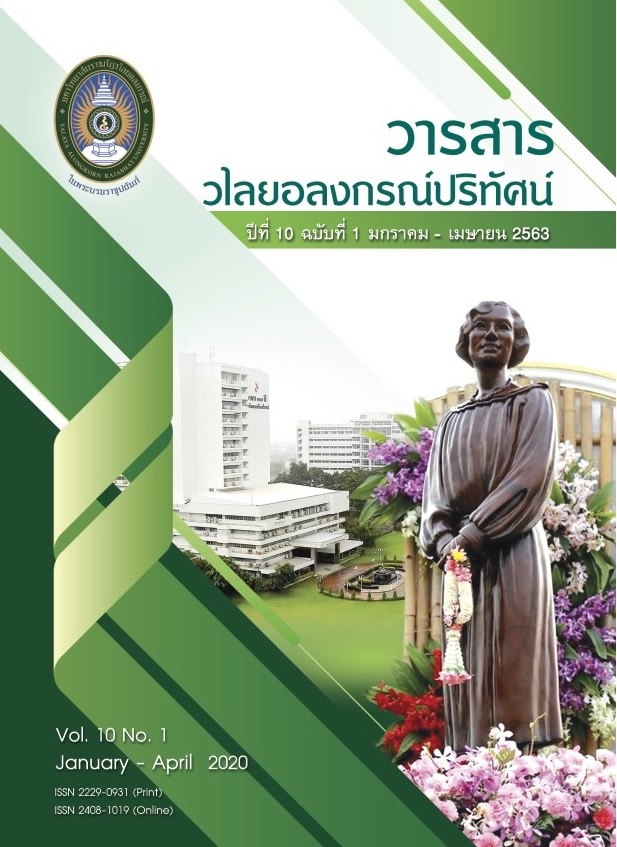ทัศนคติของพนักงานเกี่ยวกับการส่งเสริมคุณภาพชีวิตและสุขภาวะของพนักงานกะกลางคืน: กรณีศึกษา โรงกลั่นน้ำมันแห่งหนึ่งในภาคตะวันออก
คำสำคัญ:
การทำงานเป็นกะ, พนักงานกะกลางคืน, โรงกลั่นน้ำมันบทคัดย่อ
การวิจัยนี้มีวัตถุประสงค์เพื่อศึกษาผลกระทบจากการทำงานของพนักงานกะกลางคืน และศึกษาทัศนคติของพนักงานเกี่ยวกับการส่งเสริมคุณภาพชีวิตและสุขภาวะของพนักงานกะกลางคืน ในโรงกลั่นน้ำมันแห่งหนึ่งในภาคตะวันออก ซึ่งเป็นการศึกษาเชิงคุณภาพ ผู้ให้ข้อมูลสำคัญ คือ พนักงานกะกลางคืนในโรงกลั่นน้ำมันแห่งหนึ่ง จำนวน 20 คน ใช้การเลือกตัวอย่างแบบเจาะจง เครื่องมือที่ใช้ในการเก็บรวบรวมข้อมูลคือ แบบสัมภาษณ์แบบกึ่งโครงสร้าง และวิเคราะห์ข้อมูลโดยใช้การวิเคราะห์เนื้อหา ผลการศึกษาพบว่า พนักงานได้รับผลกระทบจากการทำงานเป็นกะกลางคืน ได้รับผลกระทบทั้งด้านร่างกาย ด้านจิตใจ และสังคม โดยผลกระทบด้านร่างกาย คือ การนอนพักผ่อนไม่เพียงพอทำให้ร่างการอ่อนล้า อ่อนเพลีย เป็นสาเหตุหนึ่งที่ทำให้เกิดโรค และกลุ่มอาการต่าง ๆ รวมถึงทำให้เกิดอุบัติเหตุระหว่างในการทำงานได้ นอกจากนี้การทำงานกลางคืนยังส่งผลกระทบต่อการรับประทานอาหารและยา รวมถึงการออกกำลังกาย ส่วนผลกระทบด้านจิตใจ พนักงานมีความเครียดจากการทำงาน และยังระบุว่า การทำงานกะกลางคืนทำให้เวลาทำกิจกรรมกับครอบครัวน้อยลงหรือไม่มีเวลาทำกิจกรรมกับสมาชิกในครอบครัว ไม่มีเวลาพบปะสังสรรค์กับเพื่อน ญาติพี่น้อง สำหรับทัศนคติของพนักงานเกี่ยวกับการส่งเสริมคุณภาพชีวิตและสุขภาวะของพนักงานกะกลางคืน พนักงานมีข้อคิดเห็นเกี่ยวกับการส่งเสริมคุณภาพชีวิตและสุขภาวะของพนักงานกะกลางคืน โดยควรมีการจัดกิจกรรมที่เน้นการส่งเสริมความสัมพันธ์ในครอบครัว เพื่อกระชับความสัมพันธ์กับครอบครัวให้มากขึ้น และการจัดสวัสดิการจูงใจอื่น ๆ ที่เหมาะสม เช่น การเพิ่มค่าความเสี่ยง การเพิ่มค่ากะ การจัดบริการให้คำปรึกษาความเครียด การเพิ่มพื้นที่ในการออกกำลังกาย การจัดกิจกรรมให้กับพนักงานกะกลางคืนโดยเฉพาะ
เอกสารอ้างอิง
ไขศรี วิสุทธิเนตร. (2558). หลับเต็มตื่น ฟื้นฟูใจซึมเศร้า. เพื่อนรักษ์สุขภาพจิต. 15(59): 112-116.
จินดารัตน์ ชัยอาจ. (2556). ปัจจัยที่รบกวนการนอนหลับในโรงพยาบาล: การจัดการโดยไม่ใช้ยา. พยาบาลสาร. 40(พิเศษ): 105-115.
ณภัทรารัตน์ ขาวสะอาด, มณี อาภานันทิกุล, และพรรณวดี พุธวัฒนะ. (2556). ปัจจัยคัดสรรที่มีความสัมพันธ์กับความสุขของนักศึกษาพยาบาล. วารสารสภาการพยาบาล. 28(1): 19-23.
นาฎนภา อารยะศิลปะธร, พัชนี สมกำลัง, จันทร์จิรา ภูบุญเอิบ, จรัสศรี สีลาวุธ, และจิราภรณ์ มุลเมืองแสน. (2560). ปัจจัยที่มีผลต่อคุณภาพการนอนหลับของนักศึกษาพยาบาลในวิทยาลัยพยาบาลแห่งหนึ่ง. วารสารวิทยาลัยพยาบาลพระปกเกล้าจันทบุรี. 28(1): 39-40
ผู้จัดการฝ่ายทรัพยากรมนุษย์. (2561, 23 มีนาคม. โรงกลั่นน้ำมันแห่งหนึ่งในภาคตะวันออก. สัมภาษณ์.
พรรณพิมล วิปุลากร. (2559, 12 กุมภาพันธ์). คนขี้เหงา เข้าข่ายเป็นโรคขาดรัก. ไทยโพสต์, น.18.
พิชญา สวัสดี. (2552). สภาพการทำงานที่ส่งผลต่อคุณภาพชีวิตในการทำงานของพนักงาน ควบคุมการจราจรทางอากาศ บริษัท วิทยุการบิน แห่งประเทศไทย จำกัด. กรุงเทพฯ: มหาวิทยาลัยธรรมศาสตร์.
ไพบูลย์ ธรรมสถิตมั่น. (2555). ประเด็นพิจารณา เมื่อจำเป็นต้องเพิ่มกะทำงาน. [ออนไลน์], เข้าถึงได้จากจาก https://www.one-stophr.com/news.php?action=view&catid =6&id=746&catsubid1=16 (2561, 21 กุมภาพันธ์).
วนิชา ดีพัฒชนะ. (2554). ผลกระทบจากการทํางานกะกลางคืนต่อการดำเนินชีวิต : กรณีศึกษา พนักงานบริษัทโฮม โปรดักส์ เซ็นเตอร์ จํากัด (มหาชน). วิทยานิพนธ์ปริญญามหาบัณฑิต คณะสังคมสงเคราะห์ศาสตร์ มหาวิทยาลัยธรรมศาสตร์.
วิวัฒน์ เอกบูรณะวัฒน์. (2551). คำแนะนำสำหรับผู้ประกอบอาชีพที่อยู่กะกลางคืน. จุลสารนพรัตน์. 4(2): 1-2.
สกุณา บุญนรากร. (2556). การสร้างเสริมสุขภาพแบบองค์รวมทุกช่วงวัย. สงขลา: เทมการพิมพ์
สำนักงานแรงงานระหว่างประเทศ. (2551). ILO คืออะไร ILO ทำอะไร. กรุงเทพฯ: สำนักงานแรงงานระหว่างประเทศ.
สุวิณณา เอกวัฒน์. (2546). คุณภาพชีวิตของลูกจ้างพนักงานขายในธุรกิจค้าปลีกห้างสรรพสินค้า. งานนิพนธ์ปริญญามหาบัณฑิต คณะพาณิชยศาสตร์และการบัญชี มหาวิทยาลัยธรรมศาสตร์.
อรพินทร์ เชียงปิ๋ว. (2555). นาฬิกาชีวภาพกับการนอนหลับ. วารสารมหาวิทยาลัยศรีนครินทรวิโรฒ. 4(7): 145-154.
ดาวน์โหลด
เผยแพร่แล้ว
รูปแบบการอ้างอิง
ฉบับ
ประเภทบทความ
สัญญาอนุญาต
ข้อความที่ปรากฏในบทความแต่ละเรื่องในวารสารวไลยอลงกรณ์ปริทัศน์ เป็นความคิดเห็นของผู้นิพนธ์แต่ละท่าน มิใช่เป็นทัศนะและมิใช่ความรับผิดชอบของกองบรรณาธิการจัดทำวารสาร และ
มหาวิทยาลัยราชภัฏวไลยอลงกรณ์ ในพระบรมราชูปถัมภ์


